No more insulting monsters and drunken sailors?
Ella Whelan is off on maternity leave. Before she goes, she looks at a free-speech war in an unlikely area: children's nursery rhymes.
For some reason, I seem to plan all my children around the Battle of Ideas festival. Back in 2022, I missed the festival by a whisker after my son was born just days before Battle commenced. But this year, I had the pleasure of chairing debates on everything from the war on the past and our relationship with history to anti-Semitism on campus, the politicisation of maternity and the future of women’s freedom to our welcome address, opening the festival - with bump in tow. All the guff from the NHS and baby experts tell you that you should be singing and reading to your baby in utero to encourage development. Well, though my ankles didn’t thank me for a weekend of debate, my daughter at least got something of a political baptism of fire listening to the rows and conversations throughout the weekend.
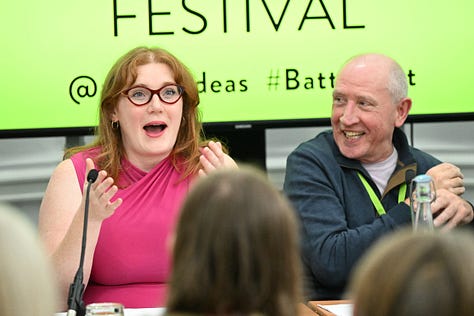

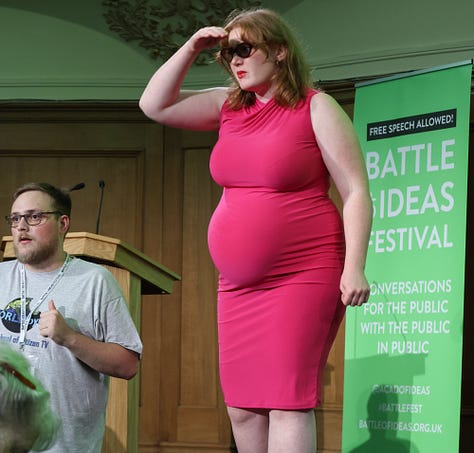
One of the discussions I chaired on the Sunday morning was Literary wars: the betrayal of Rushdie and artistic freedom. I had a great panel of speakers, with Ralph Leonard, Jenny Lindsay, Joe Nutt, Martin Robinson and Gillian Philip - who was a children’s author before she was cancelled for being gender critical. In fact, much of our discussion focused on kids’ books - possibly because so often book bans hide behind an idea of ‘appropriateness’, like whether reading Huckleberry Finn to your kid will turn them into a rabid racist because of the existence of the n-word.
But - would you believe it - it’s not just children’s books that are under attack, but nursery rhymes, too. The Scottish Book Trust has attempted to take all the fun out of a sing song by sanitising the lyrics to old favourites. The 'drunken sailor' is now 'grumpy', the 'little boy who lives down the lane' is now a gender-neutral baby. Having adopted a Black Lives Matter-inspired project called 'Read Woke', the trust has also banned songs like 'Five Little Monkeys', as the song is allegedly linked to a previous version that used the n-word.
These kind of sanitisation projects have nothing to do with child development or learning - this kind of fun-sucking is all for the adults. Every parent is haunted by the jingle of nursery rhymes. We find ourselves humming ‘Incy Wincy Spider’ while writing emails or circling ‘Twinkle Twinkle Little Star’ while trying to get to sleep. It only takes one killjoy to ruin it for everyone - we now sing the 'parents on the bus' because someone complained about inclusivity at our playgroup, despite the room being almost exclusively filled with mums. You could be singing Cardi B to babies under one, as long as it’s got a good rhythm they usually enjoy bopping along. But when children begin to grasp the meaning of words, that’s when the fun really starts - and with toddlers, the darker the better.
There’s a reason why so many nursery rhymes involve ducks that 'don’t come back' to their mother, or crocodiles who 'snap that monkey out of the tree': toddlers are creatures of extremes. They certainly don’t care about the gender of Mrs Polly’s Dolly, only that she is 'sick sick sick'. Having double meanings for children and adults is also good fun - one of my nursery favourites was a rhyme about drinking set to the tune of The Champs’ 1958 hit ‘Tequila’. There is something endlessly charming about a clash of childish innocence and adult humour.
Children’s minds are both innocent and limitless, they thrive on the unreal and the terrifying because the trappings of logic or social norms don’t apply. So many of the best children’s storytellers understood this desire for the bizarre and even cruel - from The Brothers Grimm to Hilaire Belloc’s unbeatable poem 'Matilda, Who Told Such Dreadful Lies and Was Burned to Death'.
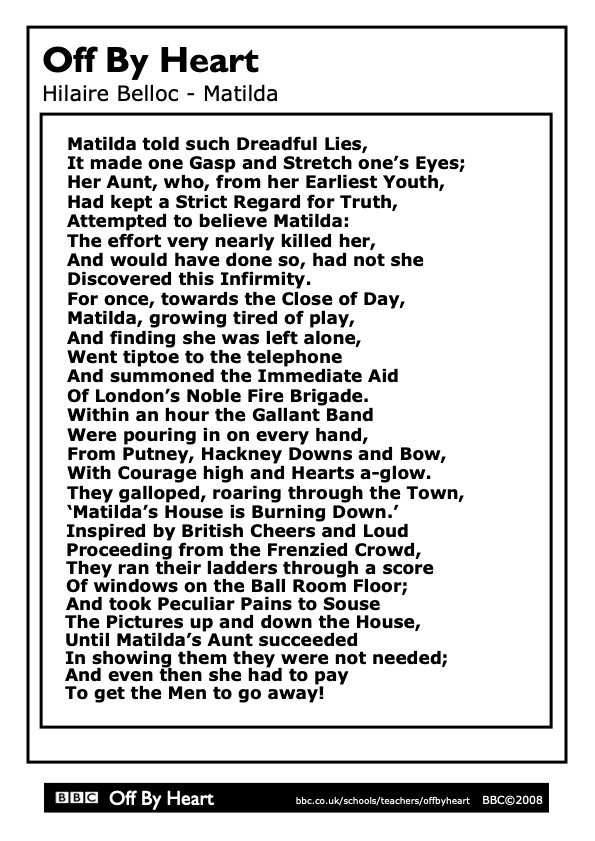
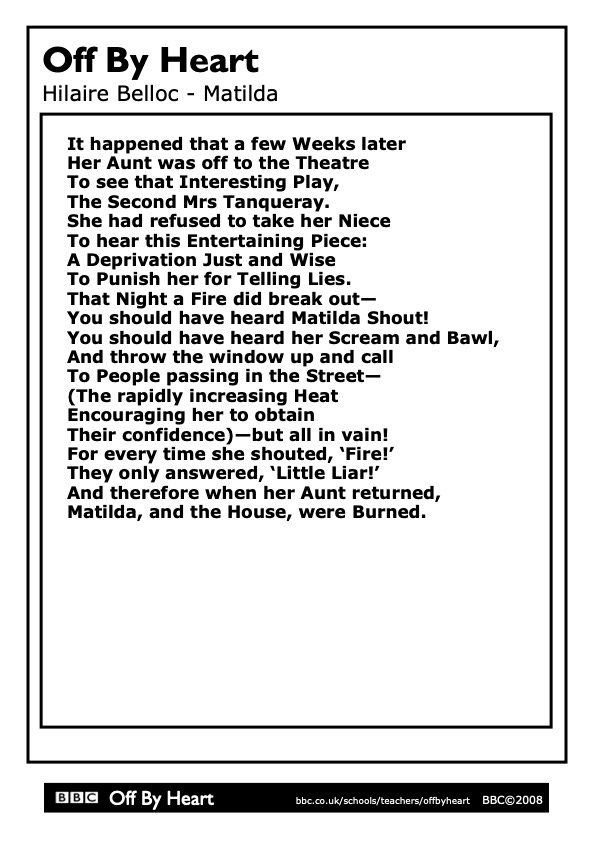
In fact, my generation of millennials were perhaps the last to experience a world of children’s literature that wasn’t geared towards political messaging. Today, all the stories are of dying frogs whose pond is being polluted by a car park, or picture books of 'top ten women in STEM'. When I was a kid, we had the likes of David McKee, whose Two Monsters hurl insults at each other like 'hairy, overstuffed, empty-headed, boss-eyed mess', or Maurice Sendak’s Pierre, who is eaten by a lion because he’s such a brat. Anthony Browne - the children’s laureate in the late 2000s - wrote and illustrated stories about bears being chased by Nazis and children getting stuck behind magic mirrors.
As usual, the Germans did bone-chilling the best - Der Struwwelpeter by Heinrich Hoffman involves a story of a boy whose thumbs are cut off for thumbsucking, complete with depictions of blood-pumping thumbless stumps.
Just because children are small doesn’t mean they don’t enjoy or understand big ideas. Those who seek to strip Roald Dahl’s work of its nastiness or turn nursery rhymes politically correct are merely making the adults in the room feel morally superior. There’s nothing worse than sanctimonious parenting. It’s time to defend the dark in children’s imaginations, or else we’re all doomed to a 2D world of rhyming banality.
And with that, I’m off. Thanks to my friends and colleagues at the Academy of Ideas for bringing me tea and biscuits for the past few months. I’ll be back once I get used to the idea of being a family of four, and will be following along with all our Substacks and posts during my time off. So make sure that you’re subscribed - paid if you can, to take advantage of our discounts and Letters on Liberty - and I’ll see you soon.


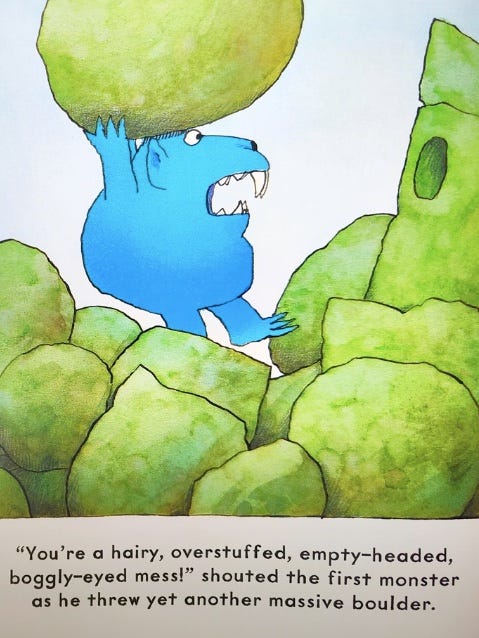

I hope you enjoy your mat leave, Ella. It's a special, if very demanding, time when children are tiny. As everyone keeps telling you, I'm sure.
Children need dark stories to warn them of the dangers that lurk around every corner. Or they did, when they ŵent out by themselves, 'free-ranging' children as they're now called. So unusual they have to have a name, whereas once (in my 1950s & 60s childhood) it was normal. They needed to know about dangers posed by strangers, not wandering too far into the forest etc.
Now all they need to know is the danger of the Internet. Tragic.
I would love to attend this festival, but I cannot afford to do so at this time, maybe next year, hopefully. Here is an idea of mine from my book, "The Separation of Corporation and State" subtitled "Common Sense and the Two-Party Crisis."
It is a new work schedule and business calendar year. It is real simple, the way it works is like this; instead of 7-days in a week there are only 5-days in a week, and instead of 52-weeks in a business calendar year there are 73-weeks. What happens in this new 15-day work month is, you work 5-days and then you have 5-days off. Everyday is both a work day and a day off. I explain more about this in my book.
~
Here is another simple idea that will help change the world too. It is a new, I hope, American Holiday called “Forgiveness Day” and it take place on the Tuesday before our Thanksgiving Day. Every country can have its own “Forgiveness Day” holiday too, and wouldn’t it be amazing if we had a “Global Forgiveness Day” too?
~
I have many more ideas I would like to share, but I will have to save those for later in case the 2 ideas I presented no one cares for.
~
If you do like these 2 ideas please take them to the “Battle of Ideas Festival. I bet it is an awesome event.
~
Lebo Von Lo~Debar
Former/Always 82nd Airborne Infantryman, Disabled Veteran for Life, & Author of the book, "The Separation of Corporation and State" subtitled "Common Sense and the Two-Party Crisis" Available on Amazon.